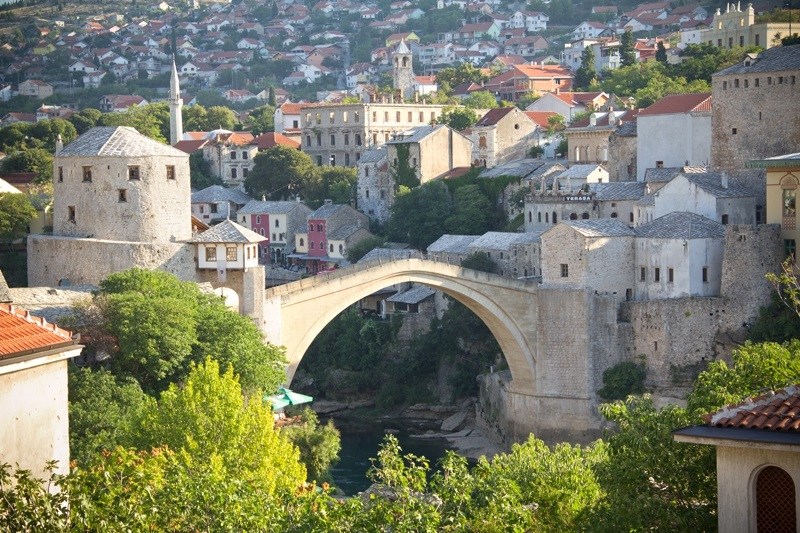To veto or not to veto – that is the burning question of EU enlargement. The self-sustaining pattern of vetoing neighbours once candidate countries want to join the club has rendered EU enlargement in the Western Balkans clinically dead.
With looming vetoes on pre-existing bilateral disputes, the strategic goal of candidate countries of entering the Union has become somewhat foggy, less credible and certainly less justifiable as an objective to offer to the population. With unexpected obstacles looming behind every corner, the finishing-line is getting farther and farther and even the frontrunners are losing their pace – and patience.
EU enlargement is most vulnerable when it comes to the power asymmetry it entails. We have seen this pattern most recently when EU member Bulgaria vetoed the adoption of the negotiating mandates with the candidate countries Albania and North Macedonia. The government in Sofia is of the opinion that Skopje should not be entitled to call its language Macedonian, largely on the grounds that it was a dialect of Bulgarian, and that North Macedonia had to give up its claim that a Macedonian minority exists in Bulgaria.
This slap in the face comes after just overcoming the decades-old Greek veto over claims on the location of the ancient region of Macedonia. Greek blockage of Skopje’s EU path led to the complete makeover of the country’s memory politics, toppling of statues, renaming of squares, highways and airports.
Most significantly, Skopje undertook no less than a change of its state name to resolve the dispute by means of the Prespa Agreement in 2018. And even the President of France had to be given a redesigned architecture of EU accession negotiations in the spring of this year before consenting to start talks with Albania and North Macedonia.
Twisting the arm of candidate countries has a long history in the EU accession process. Italy challenged Slovenia over the Foibe massacres in WWII and the exile of the Italian populace of Istria, Dalmatia and Fiume. Austria, Germany and Central Eastern Europeans disputed the Beneš decrees which legitimised the removal of the Czechoslovak citizenship of German and Hungarian minorities, and the expropriation of their property after 1945. The decrees effectively led to the expulsion of 2.5 million Sudeten Germans from Czechoslovakia.
Slovenia forced Croatia into a judicial dispute settlement over the state border during Zagreb’s accession negotiations in 2009 – which after a politically imploded but legally valid arbitration procedure is now a frozen conflict imported into the EU. Croatia itself, once it had become an EU member, repeated the exercise when it vetoed the opening of negotiation chapters with Serbia over issues such as war-crime jurisdiction or missing persons for a while in 2016.
Even within Bosnia-Herzegovina (BiH), the country’s national interest was shot in the foot last year when the leader Republika Srpska vetoed a prior agreement in the BiH presidency to call on Croatia to resolve the long-standing dispute over maritime access for the port of Neum. It appears that Serbia‘s historically solid relations with China (which is building the Pelješac bridge in Croatia to bypass BiH when reaching Dubrovnik) were not to be put at risk – at the expense of Sarajevo’s overall interest.
Historical matters and past grievances have shown to be one of the most important obstacles of the EU accession process. This became crystal clear with the collapse of communism in Europe in 1989 when Central and Eastern European (CEE) countries and the Baltic states re-established their national memory and sought acknowledgement of their experiences on a transnational, European level.
The EU accession of the CEE countries spurred a process that we can call Europeanisation of memory – whereby EU institutions and their representatives attempted to resolve historical matters of the past by seeking the lowest common denominator with an aim to induce some sort of reconciliation and pacification of tensions. Yet, is the Europeanisation process in some way producing a reconciled view on the past and historical narrative, if it is hijacked by national interests of its member states?
Recent studies suggest that this is not the case: Europeanisation of memory is fundamentally un-transformative with short-term effects that are unsustainable in the long run, as European nation states do not renounce their monopoly over interpretation of the past.
As regards the Western Balkan countries, those longest-standing in the EU queue, the issues relating to reconciliation, good-neighbourly relations and resolving of bilateral disputes remain deeply politicized and instrumentalised.
The credible commitment of the EU towards the Balkans has mutated over decades from a promise of a joint future in the EU into a firm, merit-based prospect of membership based on the union’s very own political, security and economic interest. As it stands now, the common interest in accepting new members to the club is lagging. While the power exercise of individual member states over candidates hardly resonates across all EU27, matters of national importance continue to take precedence over communitarian interest and objectives, rendering EU enlargement clinically dead.
Even the smartest design of EU accession negotiations cannot work as long as accession talks are being deliberately burdened with unresolved bilateral issues for domestic reasons. With conditionality being deaf to the ground-effects of prolonged bilateral disputes and helpless in overriding the power asymmetries, the wannabe members are coerced into making concessions while playing the long game. The veto scenario is likely to repeat in the future, as new members will want to exercise the same “right” in ascertaining the power with an aim of obtaining concessions from their non-EU neighbours.
The EU should not be a vehicle to sustain old national narratives in the Western Balkans, but an opportunity to look ahead and embrace a collaborative future to the benefit of everyone.
By Ana Milošević and Thomas Bickl


